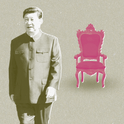Since Napoleon's invasion of Egypt, every western incursion in the middle east has generated waves of fury. While Arabs and Muslims see Iraq attacked and its people killed, many will feel that-in the words of the Egyptian journalist, Hani Shukrallah-"we are all Iraqis now."
In the first three weeks of the war, the British media was full of dire warnings about the radicalisation effect that the conflict would have on Arabs and Muslims-especially in the event of a long US occupation. But it is not clear that, following this war, Arabs will turn in any greater numbers to physically attacking the west, or their own governments, than they have in the past.
Colonialism and the catastrophe of the 1948 war against Israel gave birth to an anti-western Arab nationalism. This ideology lost prestige following the 1967 war. During the 1970s, the mantle of the anti-western avant-garde passed to the Islamists and especially to Iran following its revolution in 1979. But, despite this history, support for terrorism among Arabs and Muslims has been patchy. The Palestinians of the occupied territories are probably the most radicalised group among the Arabs, having a clear cause and enemy. But even among them, supporters of the Islamist group Hamas, which seeks to destroy Israel, count for around 20-30 per cent of the population in the West Bank. Although similar feelings of frustration are widespread among Arabs and Muslims in the middle east, most live in far more benign circumstances than the Palestinians.
Previous experience of wars in the area suggests that the upsurge of violence may be short-nine months, I was told by one scholar of terrorism-before the violence falls back to pre-war levels. But the evidence is ambiguous. US State department statistics for total international terrorist attacks (1981-2000) peaked in 1987, then fell and rose again in 1991, the year of the first Gulf war, but generally decreased for the rest of the decade. If we look at terrorist attacks in the middle east, after the first Gulf war the numbers of attacks fell every year from 1994 to 2000. Why? Perhaps because this was the period that began with the Oslo Declaration, and so was a relatively peaceful one in Palestine. It also saw the Algerian and Egyptian governments gradually defeat violent Islamist movements. In western Europe in the same period, the trend for the numbers of terrorist attacks was also down. This could confirm the theory of a rise in terrorism just after the Gulf war and then a fairly swift tail-off.
However, there are counter-examples of more sustained rises in violence. In 1986, the US bombed the Libyan capital Tripoli following the murder of US soldiers in a Berlin nightclub. In the three months following the US raid, bombings and assassinations doubled, and over the next two years Libyan-sponsored violence against the US rose sharply compared to pre-1986.
States such as Egypt are careful to prevent almost any kind of organised anti-government activity. And in 1992 the government broke the connection between the Islamist Gamaa Islamiya and its supporters in the Cairo shanty town of Embaba by sending in troops to arrest 5,000 Islamists and then taking control of the local mosques and pouring money into the neighbourhood. Meanwhile, the Islamists' campaign of assassinating tourists disgusted ordinary Egyptians and hurt the economy, reducing support for the Islamists.
Moreover, even if one did want to join a terrorist group in the middle east, it is not always simple. Some groups, such as Hamas, have a political front organisation. But many are secret societies, especially those in police states such as Saudi Arabia, and even if they can be found, the group may turn away new recruits for fear of informers.
Last month in Suez, the Egyptian President Hosni Mubarak warned his soldiers of the consequences of the war in Iraq: "Instead of one bin Laden," he said, "we will have one hundred." But some analysts believe that bin Laden's moment has passed.
Al Qaeda is not rooted in a community or a place. Unlike Amal or Hizbollah among the Lebanese Shi'is, it has not emerged from a particular group whose interests it supports. Deracinated and unable to start a revolt in the Arab lands, al Qaeda had to resort to spectacular provocations in the hope that the US would overplay its retaliation. Unlike in the 1980s and 1990s, Algeria and Egypt are no longer at risk of an imminent Islamist revolution, because the Islamists have failed to become the champion of the poor and the devout middle classes against the state-as happened in Iran. And in Iran and Turkey, Islamist movements have compromised with democracy.
If a legitimate and popular state can be set up in Iraq, the US and its allies can avoid radicalising the peoples of the middle east. The obvious channels for Arab anger to flow into-pan-Arabism and Islamism-are dilapidated. But the lessons of history are only broad guides: this time could be different. Some perceived injustice in Iraq could lead to an ideological mutation. This happened in the 1970s when Ayatollah Khomeini reworked traditionally quietist Shi'ism into a revolutionary movement. It has happened again recently in the West Bank, where the al-Aqsa Martyrs' Brigades, part of Yasser Arafat's secularist Fatah faction of the PLO, have taken up suicide bombing, once the preserve of Islamist groups. So the dire warnings should be treated with scepticism, but not ignored.











